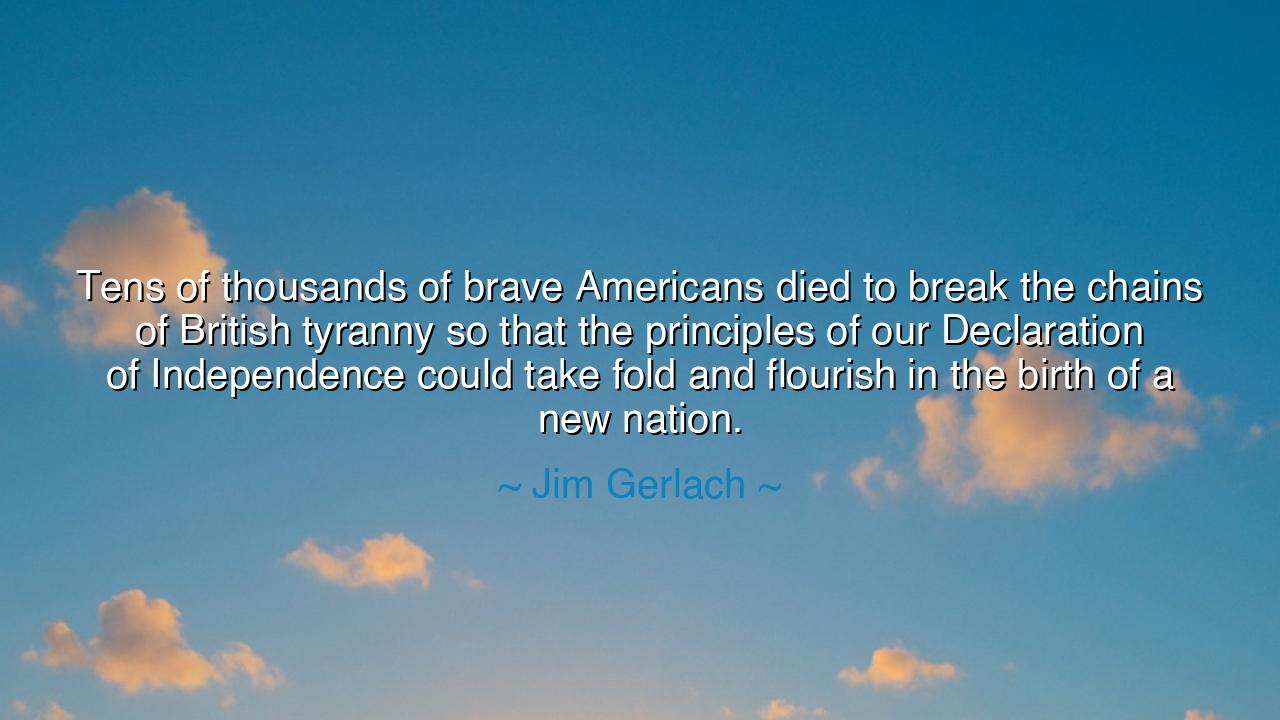
Tens of thousands of brave Americans died to break the chains of
Tens of thousands of brave Americans died to break the chains of British tyranny so that the principles of our Declaration of Independence could take fold and flourish in the birth of a new nation.






The words of Jim Gerlach, though spoken in a modern age, echo with the ancient fire of liberty’s eternal flame. When he declared, “Tens of thousands of brave Americans died to break the chains of British tyranny so that the principles of our Declaration of Independence could take fold and flourish in the birth of a new nation,” he was not merely recounting history—he was invoking a sacred remembrance. His words are a hymn to sacrifice and a reminder of what was endured so that freedom might live. They carry the weight of blood, courage, and conviction—the very elements that forged the soul of a nation and shaped the destiny of mankind.
To understand the origin of this quote, we must return to the crucible of the American Revolution, when ordinary men and women rose against the might of an empire. The Declaration of Independence, written in 1776 by Thomas Jefferson and signed by visionaries who pledged their “lives, fortunes, and sacred honor,” was not a document of rebellion alone—it was a proclamation of moral truth. It declared that all men are created equal, that they are endowed by their Creator with inalienable rights—life, liberty, and the pursuit of happiness. Yet those words, luminous and defiant, demanded proof. They demanded sacrifice. To turn words into freedom, tens of thousands gave their lives upon battlefields soaked in mud and blood—from Lexington to Saratoga, from Trenton to Yorktown. Gerlach’s words remind us that the freedom we inherit was not born of comfort, but of struggle.
The chains of tyranny were not merely political—they were psychological and spiritual. The colonists faced the most powerful empire on earth, its armies vast, its fleets unmatched. They were farmers, blacksmiths, teachers, and tradesmen, yet they dared to believe that liberty was worth more than life itself. They were not fighting merely for independence from Britain, but for independence of the human soul from oppression. It was the dawn of a new idea—that a people could govern themselves, not by decree of kings, but by the consent of the governed. Gerlach’s reference to these “tens of thousands” is not a number—it is a testament to an immortal truth: that the price of freedom is always measured in the blood of the brave.
Consider the story of George Washington and his army at Valley Forge in the winter of 1777–1778. The soldiers were half-starved, barefoot, and freezing. Disease spread through their ranks, and many died not by bullet, but by hunger and frost. Yet even in their suffering, they did not surrender. When Washington rode through the encampment, he found men praying in the snow, their voices rising like smoke through the cold air. They prayed not for victory alone, but for the strength to endure. Their faith was not in comfort, but in the righteousness of their cause. From that suffering emerged a force that could not be conquered, for it was built not of muskets and cannons, but of conviction. It was in those fields of desolation that the principles of independence took root and began to flourish.
In the voice of the ancients, we may say: the birth of liberty is always attended by pain. No great truth has ever entered the world without travail. The birth of a new nation, as Gerlach spoke, was like the birth of a new world order—an order where the dignity of the individual triumphed over the arrogance of rulers. The Revolution was not merely an American event; it was a beacon that lit the fires of freedom across the earth. From France to Latin America, from Europe to Asia, the cry of independence would echo again and again, inspired by the example of a small people who dared to challenge an empire.
Yet Gerlach’s words carry also a warning. For the principles that “took fold and flourished” can also wither if neglected. Freedom is not a monument to be admired—it is a garden that must be tended. The courage that broke the chains of tyranny must be reborn in every generation, for the enemies of liberty do not always march under banners or wear crowns. Sometimes they come disguised as indifference, complacency, or fear. The same spirit that led patriots to the battlefield must guide citizens to defend truth, justice, and equality in their own time. For if we forget the cost of freedom, we risk losing it—not by conquest, but by decay.
The lesson of Gerlach’s words is clear and profound: freedom is not inherited—it is earned, protected, and renewed. The heroes of the Revolution fought for principles greater than themselves, believing that the light they kindled would guide future generations. It is now upon us to keep that light burning—to live with the courage, integrity, and unity that they died to preserve. Every act of honesty, every defense of justice, every voice that speaks against oppression is a continuation of their fight.
And so, the practical path is this: remember the cost, live the principle, and defend the promise. Let no one forget that liberty is sacred because it was paid for in sacrifice. Teach your children not only the names of the heroes, but the virtues they embodied—courage, duty, and faith. For as Jim Gerlach reminds us, the freedom we enjoy today was not granted—it was won by those who refused to live as slaves. And in honoring their struggle, we too become guardians of that immortal flame—the flame of independence, born in pain, sustained by courage, and destined to shine for all who love freedom.






AAdministratorAdministrator
Welcome, honored guests. Please leave a comment, we will respond soon